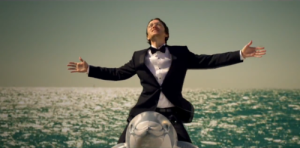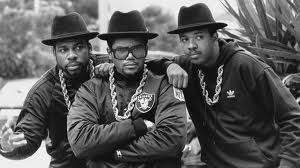What began in a small New York neighborhood has escalated to a billion dollar business. The precursors of the development of rap music can be credited to many things. West African storytellers, the jazz musicians of the 1920s, and even the lyrical stylings of Gilbert and Sullivan plays can claim to have used the same distinctive style of speech that characterizes rap. Modern rap music is not identifiable until the ‘Golden Age’ of rap, from the late 1980s to the early 1990s, when rap infused with hip hop to become a dominant force in popular culture. Acts such as Run DMC and NWA had vastly different styles, but they both utilized the same artistic medium and made music with larger causes in mind.
Run DMC’s first single, ‘It’s Like That,’ starts off with the line “Unemployment at a record highs/ People coming, people going, people born to die,” and is now considered ‘one of the first hardcore rap song(s).’ While Run DMC became known for their social commentary, clean lyrics, and fusion of rap, hip hop, and rock, the N.W.A was also rapping about social injustices that they knew too well. Considered one of the pioneers of ‘gangster rap’, N.W.A became divisive because of their use of explicit lyrics and violent imagery. Underneath the tough veneer, lies a shockingly realistic portrayal of life as they knew it, with corrupt and brutal cops, and violence that lurked around every street corner. The N.W.A was officially condemned by the FBI, and rap artists at the time became targets for people who were uneasy about the issues being brought to the forefront by rap music. But despite the criticisms, rap music occupied an important place in a culture that was struggling with important social issues.
However, sales today indicate that rap/hip hop no longer occupies as important of a place in the music industry. Songs that exposed injustices or celebrated culture are no longer at the forefront, and the most popular songs are simple melodies with vulgar lyrics about materialistic concerns like money and women. Artists that have overcome hardships in their lives and made it in the music industry are more interested in using their status for product endorsements than to speak to issues that the majority of music listeners care about, causing fans to question their credibility and authenticity. One of rap’s own legends, KRS-One, even commented on what the music has become: “The music is garbage. What has happened over the past few years is that we have traded art for money, simple and plain, and the public is not stupid.” The facts bear him out. Rap sales have decreased over 40% since 2000 and they are poised to continue their downward trajectory. According to Steve Jones, a music critic from USA Today “There are signs that many music-buying Americans are tiring of rappers’ emphasis on “gangsta” attitudes, explicit lyrics and tales of street life and conspicuous consumption.” This unabashed and excessive triumphalism of material wealth is rich grounds for parody and satire, whether in the guise of Korean rapper Psy’s hit ‘Gangnam Style’, which satirizes the overindulgences of the Gangnam district in his homeland, or comedic groups such as The Lonely Island.
The Lonely Island consists of Andy Samberg, Akiva Schaffer, and Jorma Taconne. Even though you can find their works in the comedy sections of itunes and music stores, the trio admits their inspiration comes from rap/hip-hop artists that they have listened to while growing up. So why does it seem that The Lonely Island is making fun of the genre they have listened to for years? Schaffer spoke on the matter in an interview: “We try to be very careful that we’re paying homage to the music. We’re using the music to tell jokes, rather than the jokes making fun of the music.” Schaffer’s point echoes what is funny about their songs; audiences laugh at the absurdity of the trio’s actions, actions which are borne from the vapidness of the most popular rap and hip-hop songs in pop culture.
The Lonely Island’s “I’m on a Boat” music video is an example of a parody that pokes fun at and resembles one of today’s rap videos. The video begins with Samberg receiving a ‘boat ride for 3’ as a prize from his cereal box. He decides to take Taconne and T-pain, a popular rap artist, who until then remained off screen. T-pain is a well known artist from the most recent years, and his presence in the video is testimony to The Lonely Island’s respect they have for the music genre, even this generation’s. The video then shows Taconne and Samberg dressed in tuxedos slurring out profanities: “Everybody in the place  hit the fucking deck,” and “Stay on your motherfucking toes, we’re running this let’s go.” Taconne and Samberg’s unnecessary use of profanity parodies the current state of rap music, where the harshness of the language is an empty display of toughness and bravado. The amount of profanity used further draws attention to how pointless the lyrics are. The three then launch into an oversimplified chorus of “I’m on a boat! I’m on a boat! Everybody look at me because I’m sailing on a boat!” Such plain and condensed lyrics show the trios’ blatant confidence in themselves just for being on a boat. The superiority theory, in which we laugh at our inferiors, plays a role in why we find this funny. The three men are ridiculous for turning a menial occasion into an overdramatic spectacle.
hit the fucking deck,” and “Stay on your motherfucking toes, we’re running this let’s go.” Taconne and Samberg’s unnecessary use of profanity parodies the current state of rap music, where the harshness of the language is an empty display of toughness and bravado. The amount of profanity used further draws attention to how pointless the lyrics are. The three then launch into an oversimplified chorus of “I’m on a boat! I’m on a boat! Everybody look at me because I’m sailing on a boat!” Such plain and condensed lyrics show the trios’ blatant confidence in themselves just for being on a boat. The superiority theory, in which we laugh at our inferiors, plays a role in why we find this funny. The three men are ridiculous for turning a menial occasion into an overdramatic spectacle.
As the song continues and the levels of silliness continue to rise, Taconne exclaims: “Straight floating on a boat on the deep blue sea/busting five knots/wind whipping out my coat,” which is an example of incongruity. Five knots isn’t fast, but the audience laughs when he puts undue emphasis on it. While the boat is slicing through the ocean at incredible speed, the camera flashes to the everyday activities of Schaffer, who isn’t on the boat. In one of these instances, the camera shows Samberg in a position imitating Leonardo Dicaprio from the movie Titanic claiming to be “king of the world.” Contrasting this image, Schaffer is shown receiving a parking ticket while Samberg raps the line: “If you on the shore then you sho’ not me-oh!” The level of absurdity steadily rises from here as the camera flashes back to Taconne who is “riding on a dolphin, doing flips and shit,” all while the audience can clearly see that it’s a blow up pool toy. To further illustrate the  ridiculousness of the situation, he raps: “This ain’t Sea World, this is as real as it gets/ I’m on a boat motherfucker and don’t you ever forget!” At this point in the video, the trio clearly establishes that they are ‘the butt’ of the joke. While Taconne and Samberg are engaging in such ludicrous activities, T-Pain hasn’t done much other than stand there. However, T-Pain tells Poseidon to “look at me.” The thought of the Greek god of the ocean being summoned by T-Pain during such an amateurish song makes this funny, and is the height of the ridiculousness that has been building throughout the song. Like any other generic rap video, the trio chose to wrap up the video with the words “shawty” and “yeah, yeah” echoing while the boat rides off into the distance. Using a customary but ultimately pointless phrase is a microcosm if what The Lonely Island is saying about the state of the industry itself: that the music, while catchy and popular, is devoid of any artistry or meaning.
ridiculousness of the situation, he raps: “This ain’t Sea World, this is as real as it gets/ I’m on a boat motherfucker and don’t you ever forget!” At this point in the video, the trio clearly establishes that they are ‘the butt’ of the joke. While Taconne and Samberg are engaging in such ludicrous activities, T-Pain hasn’t done much other than stand there. However, T-Pain tells Poseidon to “look at me.” The thought of the Greek god of the ocean being summoned by T-Pain during such an amateurish song makes this funny, and is the height of the ridiculousness that has been building throughout the song. Like any other generic rap video, the trio chose to wrap up the video with the words “shawty” and “yeah, yeah” echoing while the boat rides off into the distance. Using a customary but ultimately pointless phrase is a microcosm if what The Lonely Island is saying about the state of the industry itself: that the music, while catchy and popular, is devoid of any artistry or meaning.
The exploitation of the present rap industry is evident in many other Lonely Island videos as well. Another example of this concept is Lazy Sunday, where Andy Samberg and fellow Saturday Night Live cast member Chris Parnell marries a style and subject that do not traditionally go together. In this case, gangster rap and a peaceful suburban afternoon of candy and movies. The chorus exemplifies this contrast, Samberg and Parnell repeat the phrase: “The Chronic-what-cles of Narnia, pass the Chronic-what-cles of Narnia,” a union of a hip nickname for marijuana and a popular movie with Christian undertones. This cleverness and appearance of being cool while performing a mundane task is part of what  is intended for viewers to find funny. Another example of the trios’ exploitation of rap’s music industry is “I Just Had Sex” which, like I’m on a Boat, features Akon, a well-known hip-hop artist from the present generation. Like the other songs, “I Just Had Sex” has a simplistic but catchy chorus, highlighting its mass appeal and lack of a greater message.
is intended for viewers to find funny. Another example of the trios’ exploitation of rap’s music industry is “I Just Had Sex” which, like I’m on a Boat, features Akon, a well-known hip-hop artist from the present generation. Like the other songs, “I Just Had Sex” has a simplistic but catchy chorus, highlighting its mass appeal and lack of a greater message.
The Lonely Island, with the help of a large audience that comes from appearing on Saturday Night Live, has made a name for themselves by creating videos that both pay homage to, and poke fun of the state of rap music. But the reason they were chosen to appear on such a long running and iconic program is because of their unique brand of humor, and the deftness with which they weave popular music and inoffensive comedy. The Lonely Island are fans of the music which they lampoon, and so understanding the roots in which the genre came from makes it easier to appreciate their satirical stylings. By utilizing the stylistic trappings that are found in rap music, they speak to its popularity, while also pointing to its humor by elevating the ridiculous lyrics and situations that are common. The songs are intended to, and are funny because they merge the two, and the popularity of The Lonely Island attests to how well they’ve done.
Works cited:
Tim Shipman, “Gangsta Rap on Death Row as the US Tunes Out,” The Telegraph, July 1, 2007, accessed October 21, 2012, http://www.telegraph.co.uk/news/worldnews/1556187/Gangsta-rap-on-death-row-as-the-US-tunes-out.html
Steve Jones, “Can Rap Regain it’s Crown?,” USA Today, June 6, 2008, accessed Ocotber 21, 2012, http://usatoday30.usatoday.com/life/music/news/2007-06-14-rap-decline_N.htm?csp=34
“Run-D.M.C. Biography”, bio, accessed October 22, 2012, http://www.thebiographychannel.co.uk/biographies/run-dmc.html
“What Inspired the N.W.A. Attitude and Fashion of the 90s”, Undercrown, accessed October 22, 2012, http://undrcrwn.com/blog/2010/5/12/what-inspired-the-nwa-attitude-fashion-of-the-90s.html
“N.W.A,” The Rolling Stone, accessed October 22, 2012, http://www.rollingstone.com/music/artists/n-w-a/biography

